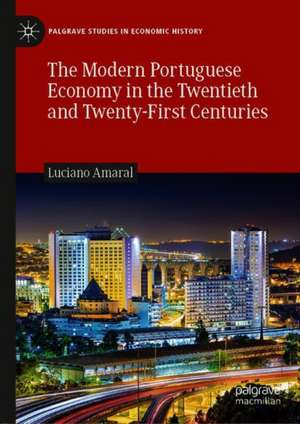The Modern Portuguese Economy in the Twentieth and Twenty-First Centuries: Palgrave Studies in Economic History
Autor Luciano Amaralen Limba Engleză Hardback – 24 aug 2019
| Toate formatele și edițiile | Preț | Express |
|---|---|---|
| Paperback (1) | 473.34 lei 6-8 săpt. | |
| Springer International Publishing – 25 aug 2020 | 473.34 lei 6-8 săpt. | |
| Hardback (1) | 646.62 lei 6-8 săpt. | |
| Springer International Publishing – 24 aug 2019 | 646.62 lei 6-8 săpt. |
Din seria Palgrave Studies in Economic History
-
 Preț: 497.34 lei
Preț: 497.34 lei -
 Preț: 358.22 lei
Preț: 358.22 lei - 15%
 Preț: 580.36 lei
Preț: 580.36 lei - 20%
 Preț: 939.29 lei
Preț: 939.29 lei -
 Preț: 292.28 lei
Preț: 292.28 lei - 17%
 Preț: 361.80 lei
Preț: 361.80 lei -
 Preț: 357.89 lei
Preț: 357.89 lei - 20%
 Preț: 690.48 lei
Preț: 690.48 lei - 17%
 Preț: 361.39 lei
Preț: 361.39 lei - 18%
 Preț: 945.79 lei
Preț: 945.79 lei - 18%
 Preț: 1012.53 lei
Preț: 1012.53 lei - 15%
 Preț: 700.29 lei
Preț: 700.29 lei - 18%
 Preț: 782.42 lei
Preț: 782.42 lei -
 Preț: 232.82 lei
Preț: 232.82 lei - 15%
 Preț: 644.82 lei
Preț: 644.82 lei -
 Preț: 384.31 lei
Preț: 384.31 lei - 15%
 Preț: 587.85 lei
Preț: 587.85 lei - 18%
 Preț: 899.21 lei
Preț: 899.21 lei - 18%
 Preț: 786.66 lei
Preț: 786.66 lei -
 Preț: 397.97 lei
Preț: 397.97 lei -
 Preț: 388.90 lei
Preț: 388.90 lei - 18%
 Preț: 737.57 lei
Preț: 737.57 lei -
 Preț: 387.20 lei
Preț: 387.20 lei - 15%
 Preț: 647.73 lei
Preț: 647.73 lei -
 Preț: 419.06 lei
Preț: 419.06 lei - 15%
 Preț: 459.06 lei
Preț: 459.06 lei - 15%
 Preț: 712.22 lei
Preț: 712.22 lei - 18%
 Preț: 787.47 lei
Preț: 787.47 lei - 18%
 Preț: 1128.57 lei
Preț: 1128.57 lei - 18%
 Preț: 949.55 lei
Preț: 949.55 lei - 15%
 Preț: 471.53 lei
Preț: 471.53 lei - 15%
 Preț: 640.88 lei
Preț: 640.88 lei - 18%
 Preț: 898.26 lei
Preț: 898.26 lei - 18%
 Preț: 1394.21 lei
Preț: 1394.21 lei -
 Preț: 422.90 lei
Preț: 422.90 lei - 18%
 Preț: 955.40 lei
Preț: 955.40 lei - 18%
 Preț: 730.47 lei
Preț: 730.47 lei - 15%
 Preț: 711.56 lei
Preț: 711.56 lei - 18%
 Preț: 783.98 lei
Preț: 783.98 lei - 18%
 Preț: 900.01 lei
Preț: 900.01 lei - 18%
 Preț: 896.08 lei
Preț: 896.08 lei - 15%
 Preț: 705.83 lei
Preț: 705.83 lei - 18%
 Preț: 787.15 lei
Preț: 787.15 lei - 15%
 Preț: 704.69 lei
Preț: 704.69 lei - 18%
 Preț: 1112.48 lei
Preț: 1112.48 lei
Preț: 646.62 lei
Preț vechi: 760.73 lei
-15% Nou
Puncte Express: 970
Preț estimativ în valută:
123.75€ • 128.72$ • 102.16£
123.75€ • 128.72$ • 102.16£
Carte tipărită la comandă
Livrare economică 14-28 aprilie
Preluare comenzi: 021 569.72.76
Specificații
ISBN-13: 9783030245474
ISBN-10: 3030245470
Pagini: 278
Ilustrații: XV, 348 p. 91 illus., 2 illus. in color.
Dimensiuni: 148 x 210 mm
Greutate: 0.59 kg
Ediția:1st ed. 2019
Editura: Springer International Publishing
Colecția Palgrave Macmillan
Seria Palgrave Studies in Economic History
Locul publicării:Cham, Switzerland
ISBN-10: 3030245470
Pagini: 278
Ilustrații: XV, 348 p. 91 illus., 2 illus. in color.
Dimensiuni: 148 x 210 mm
Greutate: 0.59 kg
Ediția:1st ed. 2019
Editura: Springer International Publishing
Colecția Palgrave Macmillan
Seria Palgrave Studies in Economic History
Locul publicării:Cham, Switzerland
Cuprins
Chapter 1: Introduction.- Chapter 2: The 1891-92 Crisis and Beyond.- Chapter 3: World War I and the 1920s Financial Crisis.- Chapter 4: The Estado Novo period: The 1930s and World War II.- Chapter 5: The Estado Novo period after World War II: The golden age of economic growth (1946-1973).- Chapter 6: The 1973 crisis, the 1974 revolution and their effects on the Portuguese economy (1973-1985).- Chapter 7: The European period (1986-2017).- Chapter 8: Conclusion: Some general topics – Government, openness and external imbalance.
Notă biografică
Luciano Amaral is Associate Professor at the Nova School of Business and Economics, Lisbon, Portugal. His recent research interests include economic growth in Portugal during the Golden Age (1950-1973) and banking in Portugal.
Textul de pe ultima copertă
This book offers insights into the behaviour of the Portuguese economy in relation to economic growth from the twentieth century to the present. How did the 1891-92 crisis and World Wars impact Portugal economically? How did the Portuguese economy behave during the 'Golden Age' of economic growth in postwar Europe? What have the effects of the European Monetary Union been? Amaral examines long-running trends in the development of the modern Portuguese economy in order to help us understand various growth phases of the modern period. This title is important reading for economic historians and economists researching economic growth, crises, stablisation and monetary unions.
Caracteristici
Analyzes key economic episodes of Portugal's modern economic history Examines Portugal's participation in the 'Golden Age' of postwar economic growth Addresses underlying themes that explain the economy's behavior, such as competitiveness, external constraints, and the growth of the Government
